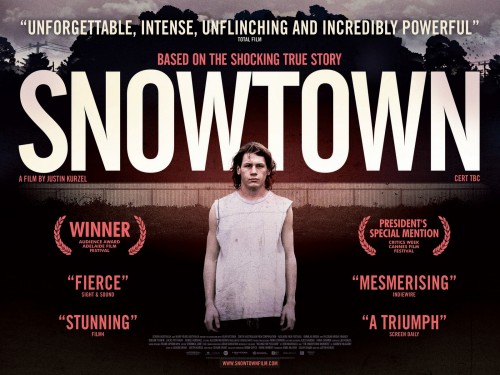
Trigger warning: this post discusses sexual violence.
The following post contains spoilers.
***
Snowtown. That is the proper title of the film. It is infinitely better than The Snowtown Murders, the title the film was given for its American release. The Snowtown Murders is obvious and boring. Snowtown is mysterious and foreboding; it implies that what happened in Snowtown is unspeakable.
It is a haunting film. It is not so much about the murders themselves, or the man who masterminded them, as it is about an innocent boy’s descent into hell.
Lucas Pittaway stars as the boy in question, the 16 year-old Jamie. An unnerving early scene makes it clear that he, along with his brothers, are being sexually abused by their mother’s boyfriend. In another (even more disturbing) scene, Jamie’s older brother Troy bullies him, wrestles him to the ground, and anally rapes him. Pittaway’s performance is striking in its understatement: he seems resigned to his miserable lot in life; drawn deep into himself, he is there, but he’s not. Observe Pittaway in the poster above: the expressionless face, the blank stare, the body language that suggests that he is trying to disappear into his surroundings. It is a chilling portrait of the nature of trauma, a surface of numbness beneath which lies an abyss of pain.
Eventually a man named John Bunting comes into his life as his mother’s new boyfriend. John seems to be the first person in Jamie’s life to stand up for him; John harasses the mother’s abusive ex-boyfriend, who happens to live across the street (a perpetual reminder of Jamie’s trauma) until the man moves. A scene in which John crushes severed kangaroo body parts (which he eventually throws at the ex-boyfriend’s house) is perhaps the first sign that something ugly lurks beneath the man’s friendly demeanor. Later on he invites Jamie over for dinner; in the middle of the meal, he turns to Jamie and says simply, “Do you like being fucked?” He then forces Jamie to shoot his (John’s) dog. This is the beginning of John’s total domination of Jamie, who he enlists as an accomplice in a series of murders. John tells Jamie that he is going to show the boy how to stick up for himself but what he actually does is destroy what remains of Jamie’s soul.
The obvious question is why Jamie goes along with John’s brutal actions. In one scene, Jamie sits silently in one room while in another John and his accomplice Robert viciously torture Jamie’s brother Troy. At this point, among others, Jamie could conceivably attempt to alert neighbors and/or notify the police and yet he does not. The abuse he has already suffered seems to have permanently broken his spirit; he is unable to act on his own accord when faced with the transgressions of his latest abuser. John thus enlists Jamie because, despite his rhetoric, on some level he sees the boy as the perfect accomplice, an individual over whom he can exert total control.
The film does not try to understand John Bunting. He is motivated at least in part by a rabid homophobia, as well as a sense of vigilante justice, yet some of his victims seem to be chosen almost arbitrarily. For example, the film ends with the impending murder of Jamie’s half-brother, who is neither a homosexual nor a criminal. Perhaps at some point in his killing spree Bunting became obsessed with the act of murder itself and longer cared who his victims were. He is an unfathomably sadistic individual. In one stomach-churning scene, he repeatedly orders Robert to strangle Troy almost to the point of death before releasing his grip; as this is happening, Bunting stares into Troy’s face with a mixture of fascination and awe. What does he see? The pain, misery, and subjugation of his chosen victim or something else, some form of meaning that only he can comprehend?
Finally Jamie strangles Troy in an act of terrible mercy. By killing is own brother Jamie kills what is left of his own soul. It is an act which brings to mind these lines from Paradise Lost:
Which way I fly is hell; myself am hell;
And in the lowest deep a lower deep,
Still threat’ning to devour me, opens wide,
To which the hell I suffer seems a heaven.
The torture and murder of Troy is extremely graphic. It is one of the most disturbing scenes I have ever witnessed. It is a crucial scene yet it is also the only murder actually depicted in the film. Snowtown is not so much interested in physical horror as a particular type of psychological horror: the horror of the self, the ultimate horror. Troy suffers unspeakably before dying but it is Jamie who must live the rest of his life with the knowledge of what he has done.
***
Ben Prescott blogs at http://friedfetusdream.wordpress.com.
Tags: Snowtown

Thank you for this. I’m watching it tonight.
[…] On October 24th HTMLGIANT will be shutting down. In August they ran my review of Snowtown. […]